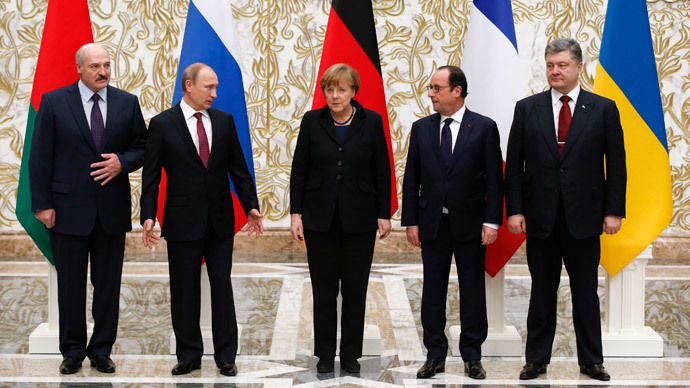‘Ukraine is a hot potato’: Why US stood back from Minsk talks?

The US can’t fully focus on Ukraine because it’s dealing with the ISIS crisis in the Middle East and as Abraham Lincoln once said: “One war at a time,” Martin Sieff, columnist for the Baltimore Post-Examiner told RT.
RT:The biggest achievement of the Minsk talks is the ceasefire, of course. But it's only going to be implemented on Sunday. Why do you think there's no immediate truce?
Martin Sieff: I think war is always messy, especially civil disturbance, that kind of chaotic war that occurs there. You are dealing with paramilitary forces with its difficulties of command and control and centralization on the rebel side in Lugansk and Donetsk. And the Ukrainian army notoriously has very pro-commanded control of its side as well. So both sides will need those several days’ breathing space just in order to get their ducks in a row and line up their formations for the agreements that were reached in Minsk.
READ MORE: Ukraine peace deal: Ceasefire starting February 15, removal of heavy weapons
RT:There have been reports of further attacks and possible victims among civilians from east Ukraine. Are the warring sides actually ready to bring about the truce?
MS: That’s a very good question. Certainly President Putin had to exercise serious pressure to restrain the leaders of both the secessionist provinces from pushing for the maximum demands. And there has been far too little coverage in the Western press about the Ukrainian army’s use of heavy artillery, in particular to continue to bombard the city of Donetsk. And there have been reports including in [Thursday’s] New York Times of continual artillery bombardment before the truce was reached.
RT:The new cover of the Economist features an image of Vladimir Putin, looking fairly menacing - with the title 'Putin's War on the West'. Do you expect the Minsk deal to perhaps change the view of Russia as a threat and aggressor among western media?
MS: I wish it would. It’s a very unjustified assessment. The Russians are reacting and have been reacting since the coup in Kiev last February to continued assaults on allied genuinely neutral regimes and on their own core security areas. But this is an image which does not have a justification in reality but it’s so deeply emotionally held in the West, especially in Britain and in the US, to an irrational degree. It’s very hard to challenge it; it’s very hard to move people’s perceptions, to make them register with the record of what actually happened. Facts never get in the way of a powerful emotional image.
RT:The US hailed those talks, but didn't participate. Why is Washington standing back here?
MS: I think there are two aspects of that. One is that the US and President Obama in particular have their hands full dealing with the ISIS crisis in the Middle East right now. And as Abraham Lincoln famously said to his Secretary of State [William] Henry Seward when he wanted to start a war with the British Empire during the US Civil War: “One war at a time.” So the US can’t focus fully or even primarily on Ukraine because of the ISIS crisis. And secondly Ukraine is a hot potato. There is such an emotional bias against Russia and so much of a dangerous and irrational war attitude in the American political as well as media world. And this is for Democrats as well as Republicans. I think President Obama finds it more prudent and in many ways sensibly and wisely to keep a low profile and allow Chancellor Merkel and President Hollande to make the running which they have done very responsibly.
The statements, views and opinions expressed in this column are solely those of the author and do not necessarily represent those of RT.
The statements, views and opinions expressed in this column are solely those of the author and do not necessarily represent those of RT.












